World's Best Diet for Weight Loss
Type 'best diets to lose weight' or 'best weight loss diet' into Google and it will duly present one hundred and thirty-nine million, five hundred thousand results – no, really. That's a helluva lot to take in, especially when there are pages upon pages of conflicting information and a lot of somewhat shaky science. It can be downright disheartening if you're trying to lose weight well, lose body fat or get rid of belly fat in a safe, sustainable way.
But, rather than get stressed over what you should be putting in your body – not to mention the myriad calorie counting apps out there – we're here to help you get clear on what the best diet for weight loss actually entails.
A quick note: if you're looking for information about the best diet plan for weight loss but you're already at a healthy weight for your age and height, think about your motivations. If you feel you have an unhealthy relationship with food or body image, consider reaching out to Beat, the UK-based charity that hopes to end the pain and suffering caused by eating disorders.
T: 0808 801 0677
E: help@beateatingdisorders.org.uk, under-18s: fyp@beateatingdisorders.org.uk
What does the word 'diet' mean?
Let's set the record straight. The word 'diet' doesn't translate directly to restriction or cutting out entire food groups. The true meaning is 'the kinds of food that a person, animal, or community habitually eats' – basically, what you regularly put in your mouth, no more no less.
Over time, the word has come to describe eating in smaller quantities or cutting out whole food aisles to lose body fat.
Why it's important we talk about living at a healthy weight
'At Women's Health we'll never steer away from important topics simply because they're tricky or controversial,' says WH Editor in Chief Claire Sanderson. 'Excess fat has a detrimental effect on your health, both mental and physical. It's undeniable that we are in an obesity epidemic in the UK, with two-thirds of the UK population considered overweight or obese, and our children are getting fatter.'
'According to the NHS, more than 1 in 5 children are overweight or obese when they begin school, and 1 in 3 children are overweight or obese by the time they leave primary school. None of these are statistics that make for happy reading.'
But the matter isn't always as clear cut as this: 'According to a BMI calculation, I'm borderline overweight – yet I barely drink, limit my sugar intake, eat a wholesome, largely plant-based diet and exercise five times a week. So it stands to reason that you can be bigger than the standard perception of what fit looks like and still be healthy.'
However, if your weight adversely affects your health – when carrying excess fat hinders your ability to do normal things, makes life less enjoyable, or increases your risk of health issues – then it's arguably time to act.
So, before clearing your cupboards and restocking á la [insert celeb's name], take five and learn about the health benefits of eating in different ways to improve your body composition – the ratio of fat you carry to muscle.
How do the best diets for weight loss actually work?
Whilst the best diets for weight loss often appear to be shrouded with some kind of magical mystery (fuelled by "top-secret" formulas that suggest superior knowledge of the key to weight loss that the rest of us aren't privy to), they actually all sport the same fundamentals – and it's a really simple calculation.
Consuming fewer calories than you expend – also known as being in a calorie deficit – is how your body loses weight. Put simply, weight is lost when you consume fewer calories than you use.
To get into a calorie deficit you could increase the amount of activity you do (using more energy) or your calorie intake could be reduced. Most health-conscious and sustainable diets encourage a combination of the two; a slight reduction in calories consumed alongside an achievable daily step-count, for example. So, whilst weight loss diets may have surface-level differences (the types of food that's limited or restricted, for example), they are all built around creating a calorie deficit.
Here's how to calculate a calorie deficit for yourself:
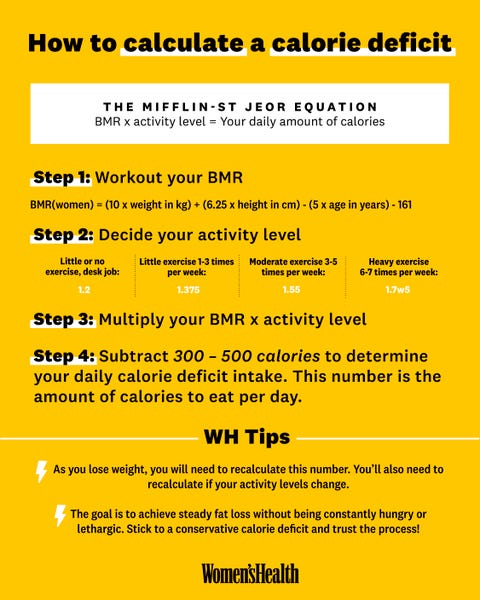
The actual key is finding a diet plan that doesn't promote an extreme calorie deficit which is, at best, unsustainable and, at worst, can negatively impact your health, and encourages a balanced intake of foods that you love to eat.
Is there ever a time you shouldn't try to diet?
Coronavirus is our new reality, that isn't a surprise. What may be new news is that illness, sickness and stress are all factors to take into account when trying to lose weight: A.K.A. if you've been sick you really do need to let your body fully recover before you even consider easing into a calorie deficit and that goes double if you're still exhibiting symptoms.
'During and after an infection the body's energy and nutritional requirements are increased,' explains GP, Dr Folusha Oluwajana. Firstly, having a fever increases the body's metabolic rate, and therefore burns more calories.
'Secondly, to effectively fight infection and support cell repair and restoration, bodies need extra calories and nutrients, particularly protein and various vitamins. Being in a calorie deficit reduces your body's access to these calories,' she says.
Added to this is the fact that food variety can go south when 'dieting' (raise your hand if dieting has ever meant chicken and broccoli on repeat) meaning your body is missing out on the proper levels of vitamins and minerals: Not good.
Dr Oluwajana's best advice? 'If you have an infection, or if you may be at risk of one, focus on maintaining an adequate and varied healthy diet to support your immune system, rather than restricting it.'
That's us told.
What's the best diet to lose weight fast?
We'll be real: any diet that allows you to lose weight quickly likely isn't at all sustainable in the long run. Losing weight quickly from dieting often comes as a result of restriction, culling entire food groups and dramatically reducing your daily calorie intake.
The risk of adopting a diet that champions these kinds of behaviours is twofold: for starters, crash-dieting can cause us to develop disordered and unhealthy eating patterns (such as labelling foods as "good" or "bad," and extreme restriction) which can have detrimental effects on our physical and mental wellbeing.
Then, there's the reality that most weight-loss diets are not sustainable long-term. The restriction of calorie intake or specific food groups can trigger cycles of bingeing followed by more extreme restriction, meaning that weight fluctuates often and the routine is repeated to no end or satisfaction. This can wreak havoc on our health, too.
Like it or lump it, the honest truth is that the best diet to lose weight fast just doesn't exist. Your safest bet, if you are, indeed, looking to lose weight, is to adopt an eating plan that encourages moderation as opposed to restriction, that's sustainable and enjoyable.
What's the best diet for weight loss?
To discern what's healthy and sustainable, WH called in the experts to sort fiction from facts when it comes to picking the best diet plan for you.
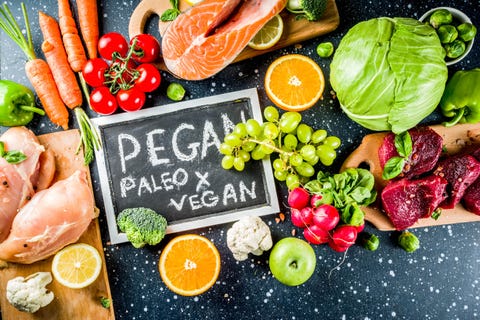
Rimma_Bondarenko
1. The Mediterranean Diet
Pasta, fish, olive oil. Mamma mia! The Mediterranean Diet is so-called because it incorporates healthy living habits from Med-bordering countries like Italy, Spain and Greece. It consistently tops the list when it comes to diets recommended by Western medicine and is similar to Public Health England's Eatwell Guide.
Typical meal: Pan-fried fish with brown rice and vegetables
What the diet advocate says: 'The key components of a Mediterranean diet are lots of vegetables, olive oil, oily fish and nuts, with no calorie restrictions. Combine that with cutting down on sugar, which was traditionally a rarity in the region, and you've got the base of the Mediterranean diet right. And if you get the base right you can eat a little of whatever else you like,' says Consultant Cardiologist Dr Aseem Malhotra.

The 30-Minute Mediterranean Diet Cookbook: 101 Easy Recipes
What the expert says: 'There is a large amount of evidence to suggest that following the MD reduces your risk of cardiovascular disease,' says registered Dietitian and British Dietetic Association spokesperson Kirsty Barrett. 'Significantly, a meta-analysis of randomised-control trials in 2011 found that the MD was effective for weight loss, though results were better when the diet was combined with energy restriction and physical activity. It has also been found to reduce LDL (bad cholesterol) more than low fat and low carb diets.'
WH verdict: A foodie diet that delivers long-term term health goals gets our vote. Eating the rainbow means it's easier to hit your nutritional micros (the vitamins and minerals that your body needs) too. Win win.
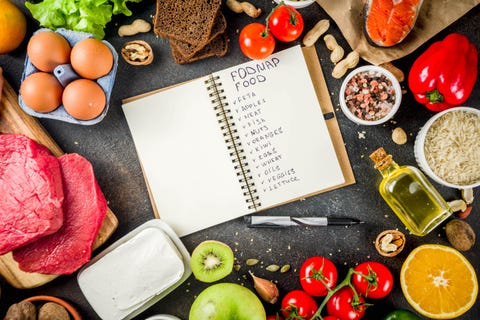
Rimma_Bondarenko
2. The Pegan Diet
What do you get if you cross a caveman with a vegan? Not a bad joke, but The Pegan Diet. An amalgamation of a vegan (plant-based) and paleo (if a caveman didn't eat it, then neither can you) diet, it delivers all the antioxidants, fibre and healthy fats you expect from a plant-based plan, with all the protein of a carnivorous one.
Typical meal: Grilled chicken with five-coloured salad.
What the diet advocate says: The brainchild of Dr Mark Hyman, he came up with the concept after finding himself sandwiched between a vegan and a paleo advocate while doing a panel talk. 'The best versions of both diets are built into the foundation: eat real, whole food,' he says.
What the expert says: 'This diet has lots of positives - we know whole grains are heart-healthy and an important source of fibre,' says dietician Priya Tew. 'But it also cuts out gluten and restricts all grains, making it unsustainable in the long term.'
WH Verdict: While it's unlikely to be popular with those who've chosen a plant-based lifestyle for ethical reasons, the principle of eating real, whole food is sound. And combining two ways of eating certainly makes it easier to get enough protein and vital nutrients. But it's still pretty restrictive, so consult a nutrition professional to make sure you aren't at risk of nutritional deficiencies.
To note: The British Dietetic Association says there's no 'wonder-diet you can follow without some associated nutritional or health risk'.
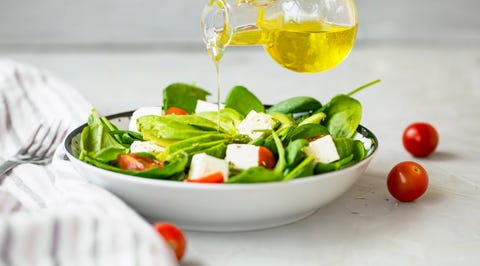
marrakeshh
3. FODMAP
While it might have been brought to your attention by your mate with the 'Kale 4 lyf' tee, know that FODMAP isn't a diet for weight loss. The acronym describes a group of short-chain carbohydrates (fermentable oligosaccharides, disaccharides, monosaccharides and polyols) which, when eliminated, improve the symptoms of IBS-sufferers, and it should only be followed under the supervision of a dietitian.
Typical meal: Sea bass with vegetables
What the diet advocate says: 'FODMAPS are either absorbed slowly from the small intestine or not absorbed at all,' says Dr Gibson, a professor of gastroenterology at Monash University in Melbourne, Australia, and the brains behind the low-FODMAP diet. 'When the FODMAPs move into the bowel, where they are fermented by bacteria, this produces gas and can also cause water to move into the bowel. This stretches the bowel wall, which stimulates the gut.'

The Complete Low-FODMAP Diet
What the expert says: 'There have been a number of cases where GPs have said, "You've got IBS, go on the low-FODMAP diet",' says Dr Megan Rossi (@theguthealthdoctor). 'The only support they give you is a printout with a limited explanation of the diet from the internet. I've had clients come into my practice who've been given a list of 10 "friendly" foods to survive on, which is nutritionally dangerous.'
WH Verdict: While studies suggest the low-FODMAP diet is effective in the management of IBS symptoms, it has also been linked with disordered eating, and should only be followed under the care of a professional.
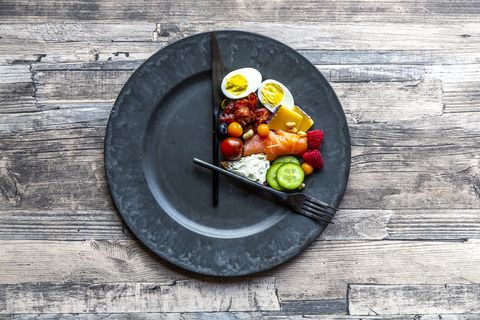
lacaosa
4. The Dubrow Diet
Think of it as intermittent fasting 2.0 (e.g. fasting for weight loss) – only a bit more complicated. Ready? Here goes. There are three windows: one to get you started, one to help you reach your goal weight and a maintenance plan. You eat within a 12-hour, 14-hour or 16-hour window depending on which phase you're in. But what you eat counts, too. The 'green light' lists of foods changes with every phase. Still there?
Typical meal: Depends on what phase you're in. And what time it is. But high-fibre carbs, lean protein, fruit and vegetables are your friends.
What the diet advocate says: 'As opposed to the keto diet that aims to get you to a ketogenic state of using fat as fuel, which isn't healthy or sustainable in my opinion, interval eating helps you go into a fat-burning state that leads to increased energy and cell renewal – a process called autophagy, the toxin-eating phase,' says Terry Dubrow, the brain behind this food movement.
What the expert says: 'Based on intermittent fasting, this style of diet has some evidence to suggest it can work for some people. But it certainly isn't going to suit all personalities and the initial stage is intense.'
WH Verdict: Alert – the Dubrow Diet is the food baby of the US reality couple Heather and Terry (she stars in the 'Real Housewives of Orange County' and he's a plastic surgeon starring in a show called 'Botched'). It has not been designed by nutrition experts and is framed as 'a diet' as opposed to a sustainable eating plan for life. Avoid.
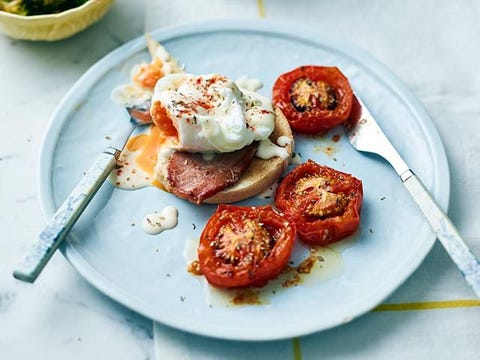
Weight Watchers
5. WW
Weight Watchers – the diet your mum used to follow – is no more. In 2018, the company underwent a re-brand, with the newer WW branding signalling a move away from diet culture and into the wellness-sphere. WW now stands for 'Wellness that Works'. 'We are not classed as a diet,' a member of the press office team tells WH. 'It is a lifestyle change – a healthy living programme that encompasses food, activity and mindset.'
As for the substance, it's been getting results for a long time but the re-brand includes Wellness Wins – rewards for small, positive behaviours which are proven to lead to healthier habits – as well as FitPoints – a system designed to encourage activity choices based on what will have the healthiest impact on you.
Typical meal: If you've got the points for it, you can eat it.
What the diet advocate says: 'We are committed to always being the best weight management program on the planet, but now we're putting our decades of knowledge and expertise in behavioural science to work for an even greater mission,' says Mindy Grossman, President and Chief Executive Officer, WW. 'We are becoming the world's partner in wellness. No matter what your goal is – to lose weight, eat healthier, move more, develop a positive mindset, or all of the above – we will deliver science-based solutions that fit into people's lives.'
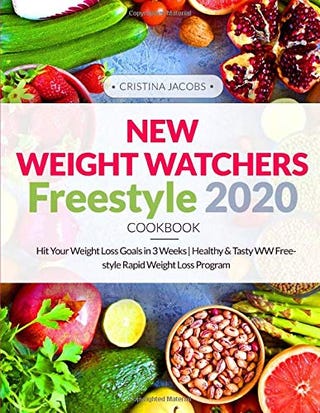
New Weight Watchers Freestyle Cookbook 2020
What the expert says: 'While it's great that WW is looking at a holistic approach, I would prefer to see a lot more emphasis on nutritional education and teaching cooking skills and portions sizes,' says Tew. 'We need to be encouraging people to tune into their internal cues of hunger, thirst and fullness as well as focusing on all over health.'
WH verdict: It's still a diet by any other name, but props to Weight Watchers for acknowledging that there's more to being healthy than 'weight'. The new platform really does consider all aspects of wellness. And with plans to partner with Alexa and Google Assistant to help track your progress, WW could be to 2020 what Weight Watchers was to the early noughties.
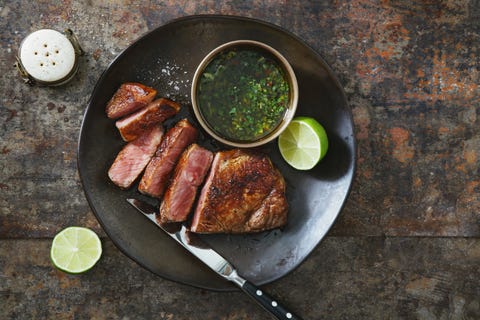
Eugene Mymrin
6. Carnivore Diet
A purely plant-based plan. We jest. As the name suggests, it's all about meat, and other animal products. In short: it's the anti-vegan diet.
Typical meal: Steak
What the diet advocate says: Controversial Canadian psychologist Jordan Peterson is a fan, crediting the diet for curing his daughter's various ailments, from juvenile arthritis to depression. But it was popularised by Shawn Baker, author of the aptly titled 'The Carnivore Diet' – in which he describes the diet as 'a revolutionary, paradigm-breaking nutritional strategy that takes contemporary dietary theory and dumps it on its head'.
What the expert says: 'A totally unbalanced diet. Fruit and vegetable have a wealth of research showing their importance in keeping the body healthy. With evidence for heart health, cancer and gut health benefits why would you cut them out?'
WH Verdict: Ethics aside, an eating plan in which your five-a-day is actively discouraged is not one for us. Swerve.
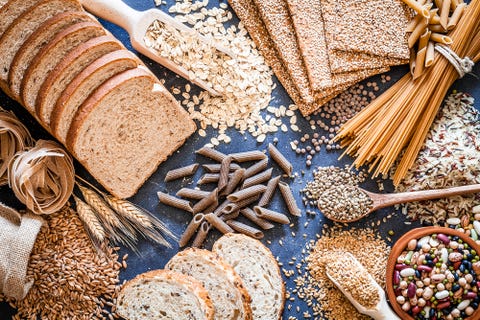
fcafotodigital
7. Carb Cycling
This one does what it says on the tin: you cycle your carbs from one day to the next. On days when you're training, you eat more, and on rest days, you eat less. It's one strand of nutrient cycling – scheduling your intake of carbohydrates around your training.
Typical meal: On a high carb day, it's wholewheat pasta with chicken. On a low carb day, it's grilled fish with asparagus
What the diet advocate says: 'It essentially means scaling your carbohydrate intake up and down in accordance with your activity levels,' explains performance nutritionist Liam Holmes (phnutrition.co.uk). He uses the principles of nutrient timing to get elite athletes and CrossFit enthusiasts to their leanest before competitions. 'The body works harder when it doesn't have carbs as fuel, so it learns to become a more efficient burner of the fuel once it is there.'
What the expert says: 'This is something that is used for athletes as part of their training. While it can lead to weight loss, carbohydrates are an energy source for the body, and restricting them can lead to headaches, fatigue and difficulty concentrating. You would be better to find the level of carbohydrates your body needs by eating normal portion sizes and a balance of all food groups.'
WH Verdict: Carb cycling is based on the principles of sports nutrition, so unless you're training enough to warrant a meticulous approach to nutrition, then it's probably not for you.
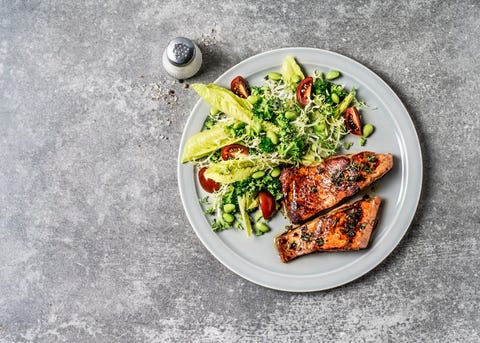
Claudia Totir
8. Dr Gundry Diet
The diet that brought 'lectins' into the mainstream – a plant-based/vegan protein found in the likes of legumes (lentils and beans), nightshade veg (tomatoes, potatoes and aubergine), eggs and grains. The man who popularised the lectin-free diet – Dr Steven Gundry – describes them as 'toxic'. In his book that brought a lectin-free lifestyle to the masses – The Plant Paradox – he cites them as the source of modern ailments from obesity to gastrointestinal disorders.
Typical meal: Pasture-raised meat with a side of asparagus
What the diet advocate says: Kelly Clarkson is a fan, claiming it helped her lose weight and improved the symptoms of her autoimmune disease.
What the expert says: 'While lectins can be harder for some people to digest, it doesn't mean we all need to all stop eating them,' says Tew. 'This is where working with a properly qualified nutritionist or dietitian can help you find what foods your body can tolerate and which ones may not be right for you.'
WH Verdict: Not all lectins are created equal and research into their impact on the body is ongoing. In fact, to date, there are no human studies linking dietary lectins with a harmful immune response in healthy people. A lectin-free diet is also incredibly restrictive, with the list of foods you can't eat reading like a typical shopping list for your average nutrition-conscious foodie, making it unsustainable and putting you at risk of nutritional deficiencies.

erdikocak
9. Intermittent Fasting
The 5:2 (the 'five two' diet), essentially you eat what you want for five days. Fast for the other two. Sounds easy. But try telling that to someone after 'lunch' on a fast day. For women, fast days means eating 500 calories (600 for men).
Typical meal: Fishcake served with asparagus and a poached egg
What the diet advocate says: Michael Mosley, the scientist behind 5:2, claims women will lose 1 lb a week, as well as seeing reduced cholesterol levels, lower blood pressure and insulin sensitivity.
What the expert says: 'Over 50 years ago researchers realised they didn't have to restrict energy every day and they still got a protective effect. In animals, these diets were shown to reduce visceral fat, oxidative stress and reduce cell proliferation, which is involved with the development of cancer. The models that were used in humans were two consecutive days of 650 kcal then five days following a normal, healthy diet, versus a healthy med diet of 1500 kcal.
This research found the weight loss was slightly greater in the group fasting for two days compared to the other group. It's worth noting that the participants in these studies were given a huge amount of support, which wouldn't happen if you were just picking up a book on the 5:2 diet. Overall, there isn't actually much evidence and we need more data on the long-term success of these diets.'
The WH verdict: The jury's still out on 5:2. And the danger is that if you literally eat anything you want on non-fast days, your daily diet could lack nutrition in favour of sugary treat-style foods. But with the research around intermittent fasting and fasting for weight loss stacking up, and more in the works, fasting is going nowhere, erm, fast.
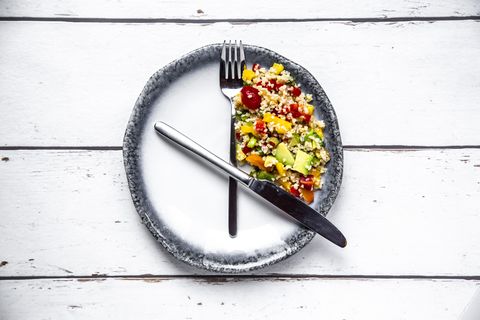
Westend61
10. The 16:8
The diet for people who love to eat. Interested? Thought so. Like its sister diet, the 5:2, this one's a numbers game. You have an eight-hour window during which you can eat, then you fast for 16 hours.
Typical meal: Whatever you fancy. As long as it's within your window.
What the diet advocate says: According to David Zinczenko, author of The 8-hour Diet, eating all your meals within a set window is the key to losing body fat.
'By carving out an eight-hour window in which to eat to your heart's content, you'll burn your body's fat stores effortlessly. The science is actually simple: For several years, researchers have been producing remarkable weight loss results in people using "intermittent fasting". In this case, fasting is about eating what you want whilst staying within a sensible eight-hour window. This gives your body the chance to burn away your fat stores for the energy it needs.'
What the expert says: 'This is based on the same principle as 5:2, but the fact that it doesn't involve calorie calculating, counting macros or dietary restriction is a bonus. There may be some benefits to IF in relation to healthy ageing, but again, more research is needed.'
The WH verdict: An early afternoon brunch and a late dinner – aka Saturday. We're onto a winner here.
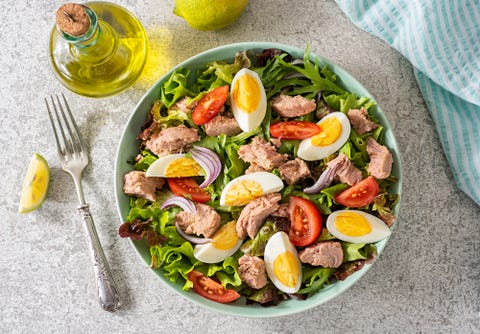
BURCU ATALAY TANKUT
11. The New Atkins
If it all feels a little bit '90s, that'll be because this was basically the diet that kept Rachel from Friends looking, well, like Rachel from Friends. Think of it as the 20th-century version of no carbs before Marbs. Thankfully though, the old premise of 'eating as much as you want, as long as you don't go near a carb', has had a makeover. The New Atkins diet reintroduces carbs in phases.
Typical meal: Steak with a side of spinach.
What the diet advocate says: 'Every phase of the New Atkins plan is based on proven scientific principles and is a completely safe, natural way to lose weight,' say Atkins Nutritionals Inc. 'Phase one is about transforming your body into a fat-burning machine and kick-starting your weight loss. By limiting the number of carbs you eat to around 20g a day, your body will switch its main fuel source from carbs to fat.'
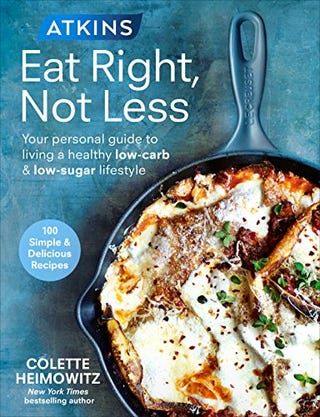
Atkins: Eat Right, Not Less: Your personal guide
What the expert says: Atkins will result in quick weight loss as the body uses all the carbohydrate stores adults tend to have. But limiting carbs will mean you could be lacking in fibre and b vitamins like niacin, thiamine and B6. Aside from cutting out a major food group, Atkins tends to result in eating a lot of food that's high in saturated fats, which is linked to raised cholesterol and heart disease.'
The WH verdict: Any diet that requires you to cut out a major food group can create a negative relationship with food, isn't sustainable in the long-term, or good for your overall nutritional intake.

Westend61
12. The Keto Diet
The ketogenic diet – keto among friends – is so-called because it aims to get the dieter into a state of ketosis, when the body stops using glucose as its main energy source and starts using ketones instead. The high fat, moderate protein, low carb diet is beloved by Silicon Valley for its alleged brain-boosting benefits.
Typical meal: Grilled chicken breast with vegetables
What the diet advocate says: 'The classic keto diet was very strict and nowadays what's become more popular even to use from a clinical scenario is called the "Modified Keto diet" which is more liberal in protein. And that's generally what people are following for weight loss and energy. That would be roughly 65-70% fat, 20-30% protein with a very small carb amount, 5-10%,' says Dr Dominic D'agostino, professor of neuropharmacology at the University of South Florida.
What the expert says: 'Like with Atkins, you will lose weight fast. The ketogenic diet is used in medicine, but under strict supervision and for set periods of time, so with appropriate support, it can be safe in the short to medium term. The brain does use glucose as its fuel of choice, so 'brain fog' and lethargy are common side effects. You'll know when your body is running off ketones by your breath – it's known as 'keto breath', and it's bad. It also can affect your ability to exercise due to a lack of quickly accessible energy.
The risks are more long term, such as the risk of nutritional deficiency (vitamin c, a, k and b vitamins) and also increased risk of bowel and possibly breast cancer due to limited fibre intake. Ketosis generally isn't recommended and it's not exactly a state the body would usually be in, but it can be done safely for set periods of time.'
The WH verdict: It might work as a short-term solution, but eat food with hidden sugars and you're back to square one. And we don't like the sound of that keto breath. We like our diets to be more #balance, less food shaming and not require army-style adherence. Avoid .
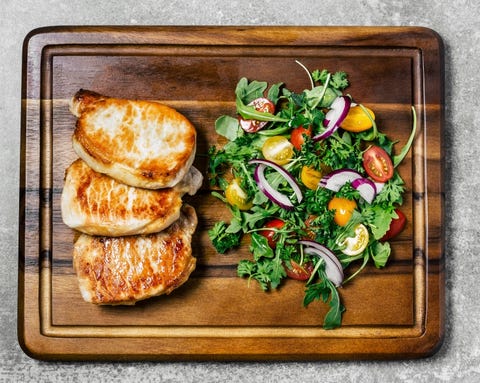
Claudia Totir
13. The Paleo Diet
The paleo diet, or Paleolithic, is dubbed the caveman diet because, if a caveman didn't eat it, neither can you. On the menu are foods that you can hunt, fish or gather – grass-fed meat, fish, nuts and veggies. Out are foods which we consume thanks to modern agriculture – cereal grains, potatoes, dairy and (surprise surprise) all processed foods.
Typical meal: Grilled lamb skewers with salad
What the diet advocate says: According to Robb Wolf, author of The Paleo Solution, Paleo is 'the only nutritional approach that works with your genetics to help you stay lean, strong and energetic.'
What the expert says: 'Paleo does promote the consumption of fresh ingredients over salty, processed meats. It also advocates a high consumption of fruit and vegetables, which is no bad thing. Research published in the journal Nature suggests that following this kind of diet can improve blood pressure, insulin resistance and cholesterol levels. That said, it is incredibly restrictive, and cutting out dairy, cereal foods and starchy carbohydrates will likely leave you low on fibre, calcium and iodine.'
The WH verdict: You might feel like you're doing your body a favour by upping your intake of fresh ingredients and cutting out the processed stuff, but #balanced it ain't.
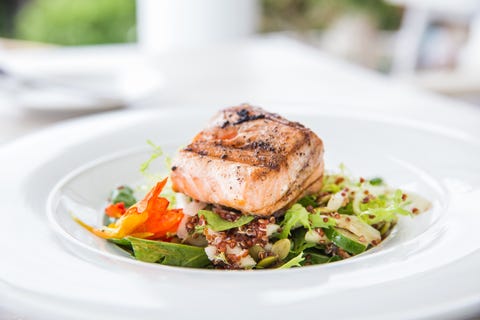
Kanawa_Studio
14. The Nordic Diet
Created in 2004 by a group of nutritionists, scientists, and chefs, to manage the growing rates of obesity and the unsustainable farming practices in the Nordic countries such as Norway, Denmark, Sweden, Finland, and Iceland, the Nordic diet stays away from processed options and encourages locals to eat what they grow. It is a diet rich in omega 3 i.e. oily fish and canola oil.
Typical meal: Salmon with lentils
What the diet advocate says: Not only is a Nordic diet comparable in terms of nutrition to the celebrated Mediterranean diet, but it also provides an easy plan for eco-friendly eating.
What the expert says: Generally nutritionist Jenna Hope says she can see the benefits long term of the diet, 'and as a general population, we need to eat more fish as we're not getting enough omega 3 as with plant-based diets, you need more food for it to be the equivalent of eating oily fish twice a week.'
However, the Nordic diet encourages you to eat low-fat dairy which Hope discourages. 'When consuming dairy such as milk, removing the full fat from the item, removes the good fats. When dairy products are also low fat, they tend to be high in sugar also.'
The WH verdict: The Nordic diet seems to be both sustainable to the planet and to our bodies as it encourages eating local, whilst also cutting down processed and sugary snacks. However, be mindful of eating low-fat dairy products as this means a reduction in good fats and necessary nutrients for the brain. Just be sure to watch your saturated fat intake, the NHS recommends no more than 20g of saturated fat a day for women.
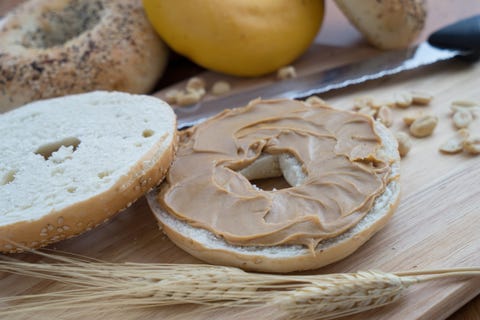
pabradyphoto
15. The DASH Diet
A diet that reduces the intake of salt, the Dietary Approaches to Stop Hypertension or the DASH diet was made for those with high blood pressure and to reduce the risk of heart disease. It is also thought to decrease cancer and diabetes risk.
Typical meal: One whole-wheat bagel with two tablespoons of peanut butter.
What the diet advocate says: DASH is a flexible and balanced eating plan that helps create a heart-healthy eating style for life. The DASH eating plan requires no special foods and instead provides daily and weekly nutritional goals.

The Mediterranean Dash Diet Cookbook
What the expert says: Though a relatively healthy diet, 'it's also another diet that encourages low-fat dairy which means you're not absorbing Vitamins A, D, E and K.'
'Vitamin D is hard to get from a diet but milk is a great source. When you're removing the fat, you're reducing the absorption.' Nutritionist Jenna Hope notes that the diet is however heavily fibre-based, which is great for your gut health.
'I would only recommend it to those with high blood pressure, essentially who the diet was created for, as cutting out regular dairy is not essential.'
The WH verdict: A step forward in the right direction to reduce extra salt intake or sugary snacks. However, it's not necessary to only consume low-fat dairy unless your GP has stated otherwise.
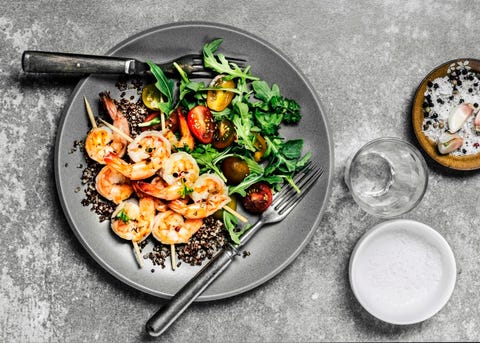
Claudia Totir
16. The Very Fast 800 Diet
Created by Dr Mosley, the Very Fast 800 Diet is for those who are trying to lose weight quickly and involves eating just 800 calories every day. Want to lose weight slowly? The Fast 800 Diet ('the new 5:2') involves eating a Mediterranean Diet for five days and cutting down to 800 calories on two days.
Typical meal: Grilled calamari salad
What the diet advocate says: For those looking to lose a lot of weight and re-set their metabolism fast... [the Very Fast 800] has been shown to help people lose weight fast, and keep it off, in the shortest time.
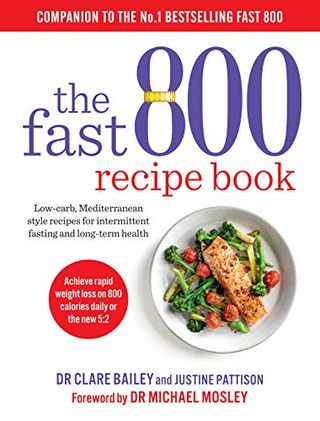
What the expert says: 'I wouldn't recommend this diet as it promotes a poor relationship with food as you are counting your calories' says nutritionist Jenna Hope. 'This then drives people to eat processed food, which is high in sugar and low in fat and is not sustainable'.
The WH verdict: Whilst the diet encourages healthy Mediterranean diet meals, counting your intake and limiting yourself to 800 calories could lead to an unhealthy relationship with food.
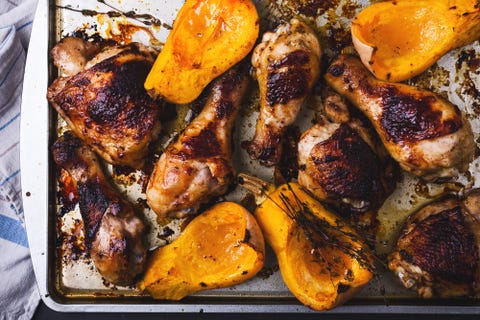
istetiana
17. The Volumetrics Diet
Created by nutrition researcher Barbara J. Rolls, the Volumetrics diet is for people who want to eat lots while losing weight. The diet revolves around low-calorie foods that contain more water like fruit and vegetables.
Typical meal: Roasted Butternut squash and chicken breast
What the diet advocate says: People enjoy eating. Research has demonstrated that if you eat foods with high water content, like a green salad or healthy soup recipes, then you'll consume fewer calories but still be satisfied. Just avoid high energy density foods like biscuits and crisps.
What the expert says: Louise Symington, the Sustainable Dietitian, says, 'the diet promotes a wide range of foods and does not ban anything, which may help prevent people becoming trapped in a "food prison". If followed well, the principles can be used for weight loss. However, healthy fats are grouped in the same 'category' as chips, sweets, cakes and other processed foods. Because they are grouped together based on nutritional density, rather than 'quality' these good fat sources risk being "demonised".'
The WH verdict: More eating and a lower calorie intake sounds ideal. But turning off all desire for sweets and nuggets? Seems a little unrealistic to us.
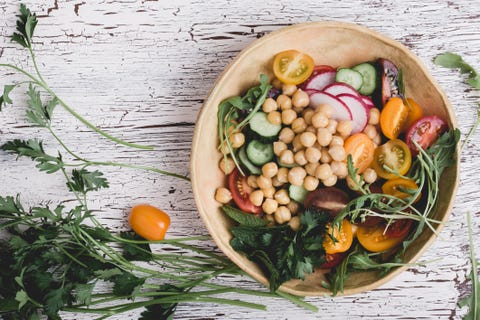
istetiana
18. The Raw Food Diet
Dating all the way back to the 1880s, The Raw Food Diet began when doctor Maximilian Bircher-Benner discovered he could cure his own jaundice by eating raw apples. Through the removal of processed foods and a focus on keeping things organic, the diet claims to give you more energy, clearer skin, better digestion and a lower risk of heart disease.
Typical meal: Cucumber gazpacho
What the diet advocate says: Christine Bailey, author of The Raw Food Diet, says uncooked food is rich in vitamins, minerals and enzymes. So, if you want to feel slimmer, fitter, leaner and healthier then the raw food diet is for you.
What the expert says: Nutritionist Pixie Turner says, 'the idea that humans are better off eating only raw food makes no sense and is far too restrictive. Some nutrients in food are more bioavailable when cooked, others when raw. This is why humans generally eat both.'
The WH verdict: Lower levels of sodium and lower blood pressure is great news. However, the science isn't convincing and eating out is going to be tricky. Your craving for a piping hot bowl of soup will be intense. Prepare to ramp up your meal prep techniques at home.
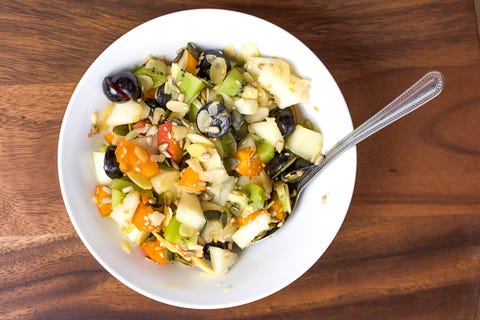
Anna&Tomasz Skoczen
19. The Alkaline Diet
Created by the author of The PH Miracle, Robert Young, the Alkaline Diet aims to replace acid-forming foods in your diet with alkaline foods that can help you improve your health. Benefits are said to include weight loss and better digestion.
Typical meal: Onion and pepper masala
What the diet advocate says: Like fire, your metabolism uses chemicals to break down a solid mass. When fire burns it leaves ash behind, similarly, the food you eat leaves behind metabolic waste. This waste is either acidic, neutral or alkaline. The more acidic your foods, the more acidic your blood, the more vulnerable you are to disease. The more alkaline you consume, the healthier you'll be.
What the expert says: 'Humans have very strict processes in the body that regulate things like blood pressure, temperature, and pH,' says Turner. 'Any deviation leads to feeling very unwell, and eventually death. If your blood were acidic you'd be dead. In other words, you can't change your blood pH through diet so this diet is total nonsense.'
The WH verdict: This diet encourages you to eat more fruit and vegetables but the positive effects on your body's PH balance are not significant. Robert Young went to jail for five months in 2017 for practising medicine without a licence, yet this diet is still being promoted by other authors. Do not touch this with a barge pole.
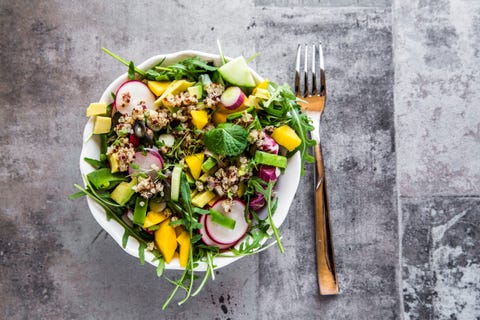
Westend61
20. The MIND Diet
The MIND diet was created by nutritional epidemiologist Martha Clare Morris through a study she conducted to lower the risk of Alzheimer's disease. It combines the Mediterranean diet with the DASH diet and focuses on foods that improve brain function like berries and fish.
Typical meal: There are no strict guidelines on how to follow the MIND diet. All you have to do is eat more of the foods encouraged by the doctors (beans, wine, poultry, fish, whole grains, berries, olive oil and nuts) and limit the dangerous ones (butter, cheese, red meat, fried food, pastries and sweets).
What the diet advocate says: The foods encouraged on this diet contain nutrients that improve brain health. Research shows following the MIND diet can lower the risk of Alzheimer's disease and keep your brain sharp over time.
What the expert says: 'Brain health is a serious public health concern, and this diet aims to reduce risk of dementia, which is a noble goal,' shares Turner. 'The emphasis on fibre and unsaturated fats is a great overall guideline, and ensures plenty of omega-3 which is vital for brain health.'
The WH verdict: Any diet that encourages you to drink wine gets a firm yes from us. The Mediterranean and DASH diets have been well-regarded by experts, so combining the two is a recipe for success.
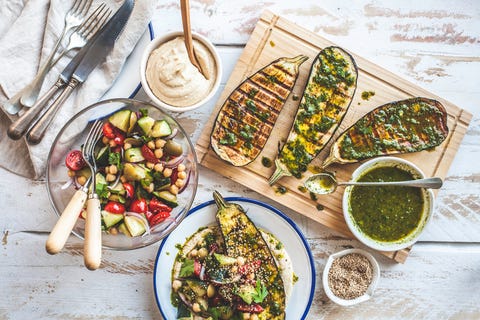
Enrique Díaz / 7cero
21. The Flexitarian Diet
The Flexitarian Diet was devised by dietician Dawn Jackson Blatner to give people the option to enjoy meat products in moderation, rather than going cold turkey as it were. So, if you want to cut down on your intake of animal products without going the whole hog this is for you.
Typical meal: Black bean burgers with sweet potato fries.
What the diet advocate says: Eating a flexitarian diet can reduce your risk of heart disease, encourage you to lose weight well and is good for the planet. There are no limitations to the number of calories, just less sugar, processed products and more vegetable and whole grains.
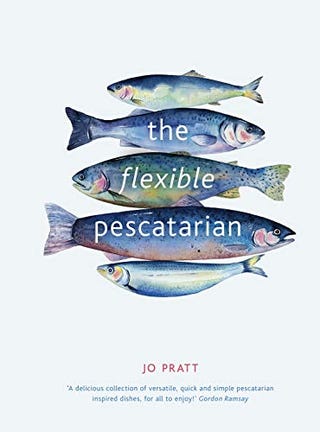
The Flexible Pescatarian: Delicious recipes to cook with or without fish
White Lion Publishing amazon.co.uk
£14.99
What the expert says: 'Veganism is often seen as the only dietary solution to planetary health, but going flexitarian emphasises plant foods without any total elimination of foods,' advises Turner. 'This is much more achievable for people, and for many people will be better for their mental health, whilst also doing its part for the planet.'
The WH verdict: This semi-vegetarian diet is so easy to fit into your existing lifestyle. You can even start with introducing meat-free Mondays and see how you get on. Just watch out for nutritional deficiencies in iron, calcium and zinc. Make sure to swot up on the best vegetarian protein sources too, though.

Eternity in an Instant
22. The CICO diet
The concept of calorie counting for weight change is based on the idea that our bodies work on a 'calories in, calories out' basis and dependent on whether we eat under, over or bang on our required amount, we'll either lose, gain or maintain our current weight accordingly.
Taking this approach means that no matter how 'nutrient dense' or 'good for you' the foods you eat are, if you eat above your body's base requirement, you'll gain weight. If you eat below, you'll lose weight.
A good benchmark is working out how many calories your body needs just to function (also known as your Basal Metabolic Rate – the number of calories your body would burn daily without doing anything) and then decide from there how to best hit your goals. Handy apps like MyFitness Pal make tracking your daily intake easy as pie – which, fortunately, you can have on this diet.

Typical meal: Anything so long as it fits into your caloric/macronutrient needs for the day.
The WH verdict: While 'calories in, calories out' can seem like a carte blanche to go wild on the chocolate and crips, those calories will take up much more of your daily budget than, say, more nutrient dense options such as fruits and vegetables. That to say, not caveating foods with 'good' or 'bad' labels is a winning feature of the CICO diet, for sure.
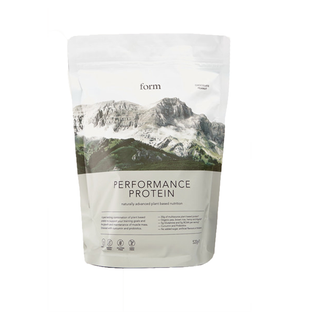
Form Vegan Performance Protein - Chocolate Peanut
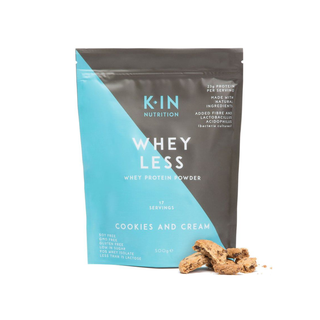
Whey Less protein powder - Cookies And Cream
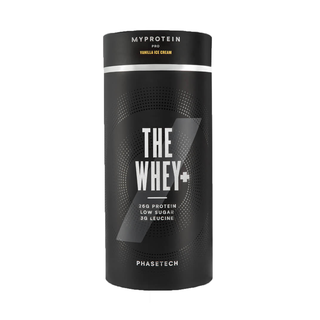
MyProtein THE Whey+ protein powder
Myprotein myprotein.com
£47.99

Complete Protein Blend - Whey, Milk, Eggs
protein bulkpowders.co.uk
£8.39
This content is created and maintained by a third party, and imported onto this page to help users provide their email addresses. You may be able to find more information about this and similar content at piano.io
World's Best Diet for Weight Loss
Source: https://www.womenshealthmag.com/uk/food/weight-loss/a707623/best-diets-to-lose-weight/
0 Response to "World's Best Diet for Weight Loss"
Post a Comment